| |
ECO-BAZAR
|
|
| |
An initiative to preserve, revive and promote the indigeneous handicraft industry on the banks of river Nila, which is struggling to thrive, is what at Vayali we call as
ECO-BAZAR.
Eco-Bazaar is our organization’s conduit through which we strive to campaign for the twin purposes of:-
- Popularizing the eco-friendly products made by artisans living on the banks of river Nila.
- Strengthening the rural economy by consolidating the foundation of the handicrafts industry.
|
|
| |
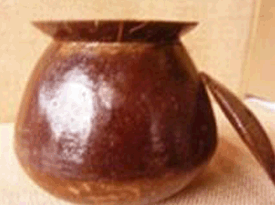 |
|
Why are the indigenous handicrafts at risk?
Since the 19th century, India’s handicraft industry, the robust foundation of its rural economy has been reeling under the wrath of numerous opposing forces. Starting with the biased British economic policies, to the growing industrialization and the subsequent flood of low price products in the market, indigenous handicrafts are dying a slow but continuous death. The boom of consumerism has left an average consumer spoilt for choice as he has ample available at a relatively lower cost.
BUT… What is not taken into account here is the cost that these so called “low cost” products inflict upon our environment and ecology. More often than not the production techniques adopted by the factories and industries are not at all eco-friendly and damage our environment beyond repair. Even more disturbing is the alarming rate at which these factories discharge their toxic waste in the nearby rivers and water bodies, thus putting our already scarce water resources on the verge of disappearance. |
|
| |
And this is where ECO-BAZAR steps in…
Through its initiative of reviving the handicrafts industry along the river Nila, Vayali also aims at reviving the cultural ties that bind the local artisans to their river Nila. Nila is the longest river in Kerala and it has nourished the land of this state for centuries. Communities like Kumbhara,Mannan and Paraya have thrived on its banks and have given it a divine status. Their culture, rituals, traditions and even their handicrafts all reflect the immensely rich culture that has prospered on the banks of this river. These communities worship “mother Nila” and are attached to it religiously as well as culturally.
Yet today, Nila is a victim of apathy both at the hands of the state authorities and the communities it has nourished since ages. With globalization and a wave of consumer revolution spreading around, the communities living along the river do not find their traditional handicrafts manufacturing work profitable enough. Despite strong cultural inclinations towards the river these communities are helpless in conserving it any longer. In search of new avenues to earn money and sustain their families, members of these communities are forced to migrate to other occupations. Sand-mining is an important and relatively lucrative occupation in this region. It has been attracting a lot of artisans but the threat that it poses to the existence of Nila is yet unnoticed. Those who stick to the traditional handicraft work are struggling for survival and are looking ways out. Thus, they are leaving the river Nila in a state of utter neglect and decay. |
|
| |
WHAT ECO-BAZAR DOES?
We at Vayali, through the medium of ECO-BAZAR have set up a shop in the village where the eco-friendly products made by these artisans are sold at a price which is both affordable to the consumer as well as remunerative to these artisans. Thus, our aim is to make the indigenous handicrafts industry an economically viable business which gives enough incentives to the local artisan communities to stay put. We plan to open such shops across the state for the promotion of the handicrafts and thereby create a conducive business environment for the artisan communities along the Nila. Our basic rationale is that if the local communities find their traditional work profitable, they would not have to leave their native places and hence they can play their part in conserving the river Nila.
It has to be understood that the preservation of precious natural resources can’t happen through mere enactment of laws or announcement of government policies. Participation of local communities who are directly related to resources both for their religious as well as economic needs is imperative. And ECO-BAZAR is a link between the helpless artisans and today’s eco-conscious citizens. We help the local communities in marketing their handicrafts to the segment of consumers who value it, thus making it a lucrative business proposition. Our endeavor is to build ECO-BAZAR as a completely people-driven initiative, whereby the talents and skills of these local communities are not wasted in other occupations and their link with river Nila remains intact. |
|
| |
What exactly does ECO-BAZAR offer you? |
|
| |
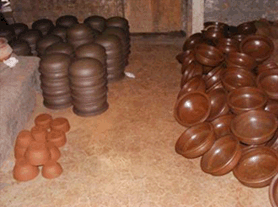 |
A wide range of eco-friendly products can be purchased from our outlets which are exceptional both in terms of their aesthetic beauty and environment friendliness. We basically deal with four varieties of products:-
Jute-products: Made by Bharathi and Uravu Jute Products, ECO-BAZAR offers you a wide range of merchandise like fancy jute bags, folders, CD holders and innumerable other utility products.
Terracotta-products: Right from flower vase to water pitchers to exquisite coffee mugs and bowls, you name it and we have it. A special mention of Gopalan, the potter who creates magic with terracotta in hands can’t be ignored at this junction. His artifacts are the prime attraction at ECO-BAZAR. (scroll down to a friendly chat with Gopalan )
Coconut-shell products: These are the most fascinating and exotic of the products, hard to be found elsewhere. Artistically crafted show pieces, attractive toys for kids--- all made of coconut shells, have a unique charm of their own. |
|
| |
|
|
| |
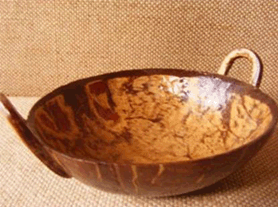
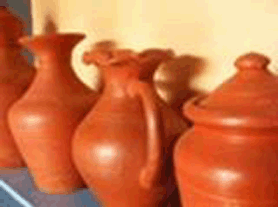
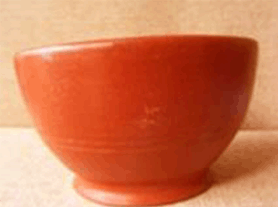
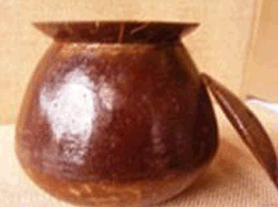
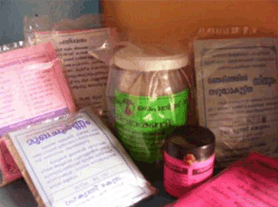
|
Bamboo products: Small baskets, pen holders, ladies purses, flower vases etc. ------our bamboo products boast of a huge variety.
We also deal in organic food and medicines.
Organic food: Organic food products like rice, rice powder, organic vegetables, honey, traditional tea and coffee and unni yappam (a traditional food product) are available at ECO-BAZAAR at the best prices.
Traditional medicines: Besides coconut-shell products, traditional medicines are the other attention-grabbing products at ECO-BAZAR. Products like padimugam (bark of a tree used as water purifier),palpodi (tooth powder),chandrabimbam (face pack),kasturi manjal( special turmeric processed for applying on face), elatazhi(for washing hair), njeringil(for mixing in water to increase the disease resistance power of body) and many more traditional medicines developed by our ancestors since centuries are one of the main attractions at ECO-BAZAR.
Apart from the above mentioned articles, we also offer you an abundant collection of books, CD’s, VCD’s which give you an idea about the rich cultural heritage and folklore of the region of Valluvenad.
Upcoming products
Taking further our initiative of promoting indigenous handicrafts, we at ECO-BAZAAR, plan to offer products made of Banana and Areca nut tree leaves. The culmination of festival season in Kerala leads to a large number of banana trees being dumped for lack of any use. We plan to use these “dumped trees” to make utility items like ladies’ purse, bags etc. Also, both banana and Areca nut trees are available in plentiful in Kerala. Hence utilizing them for economic purposes will serve the twin objectives of:-
* Making the most of natural resources
* Providing the local population with an alternate, economically viable source of employment.
ECO-BAZAR is one of those rare initiatives where you can buy products both for daily use as well as for the purpose of gifting others. Our collection of handicrafts, organic food and traditional medicines, is a rare one, hard to be found elsewhere.
As a buyer, you try to get cheap products, as a smart buyer you try to get cheap and the best of products. But when you buy at ECO-BAZAR, you are a step ahead and are a socially responsible buyer as well. The products that you buy at ECO-BAZAR have a personal touch of nature in them. They make you realize the fact that this is a legacy that your ancestors left to you and now you, yes, you the consumer have similar responsibility to leave something for your children and grand children.
And ECO-BAZAR is right there to help you in your endeavor. If you are buying an ECO-BAZAAR product you are making your contribution to save the river Nila, help the traditional artisans prosper and ensuring a rich future for you coming generations. This may be, to use the immortalized words, a small step for man but a leap for the mankind. So, shop, non-stop, at nature’s very own ECO-BAZAR.
As his hands curl around the potter’s wheel, Gopalan creates magic out of mud. This potter belongs to the Kumbhara community whose forefathers migrated from Andhra Pradesh and settled on the banks of river Nila at Ezhumangad in Palakkad district.
Reminiscing about the good old days, three decades back, he tells us that there used to be more than 55 families in the colonies of Kumbhara. But with the popularity and cost effectiveness of plastic products, his traditional occupation took a hit and became unprofitable. Consequently, many of the Kumbhara families migrated to the cities and only 33 families are left in the region. Even, Gopalan, bogged down by adverse circumstances went on to work in Mumbai and even Dubai, where he could earn upto Rs.250 a day, but what this humble potter couldn’t earn was professional satisfaction. So, he’s back in Kerala, earning the joy and satisfaction out of his potter’s wheel.
Gopalan wakes us up to the fact that drinking water in mud patram (pot) keeps us healthy and provides immunity from infections, much better and cheap than our modern day filters. Just then we are joined by his wife who surprises us by telling that they have been using the same mud pot to store water for the last 8 years, and it is just as good. The reason--- it has been made from the best quality mud obtained from the banks of river Nila.
The very mention of Nila brings wrinkles of dejection on Gopalan’s face. He rues the fact that many potter’s like him are no longer allowed to procure mud from the banks of Nila because it is no longer a common resource. He tells us that the banks belonged to God and the local communities were just the custodians. But now individuals hold property rights along the banks and deprive the potter’s of their only source of mud. We learn that encroachments along the river Nila are threatening its very existence.
As our conversation veers to the end, we ask Gopalan if he will encourage his kids to join the traditional occupation. He smiles vaguely and answers neither did he learn pottery consciously nor will he force his children to do so. But he proudly tells us that his eldest son assists him in work will carry Gopalan’s rich legacy forward.
|
|
| |
|
|
|
|







